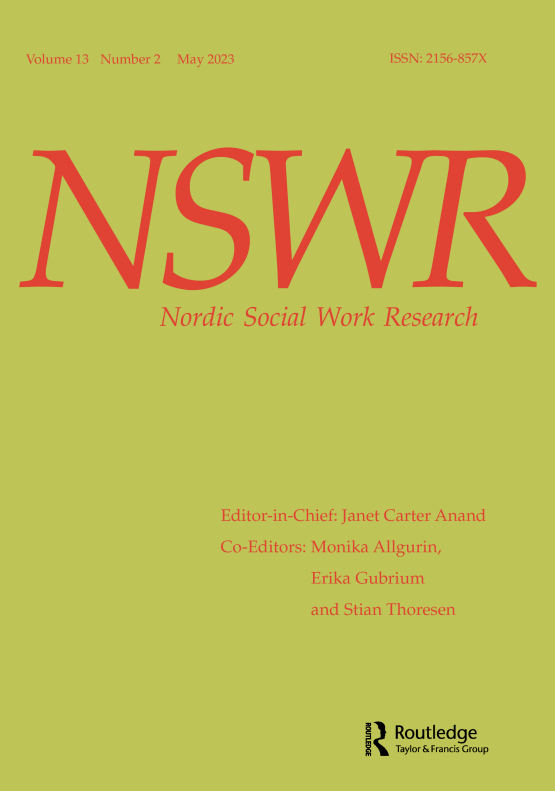Submit a Manuscript to the Journal
Nordic Social Work Research
For a Special Issue on
EVERYDAY RESISTANCES IN THE NORDIC WELFARE STATE
Abstract deadline
01 September 2024
Manuscript deadline
31 December 2024

Special Issue Editor(s)
Marjo Kuronen,
University of Jyväskylä, Finland
[email protected]
Jenni Simola,
University of Helsinki, Finland
[email protected]
Sandra Andersson,
Karlstad University, Sweden
[email protected]
EVERYDAY RESISTANCES IN THE NORDIC WELFARE STATE
In this special issue, we invite researchers to discuss what everyday resistance has to do with the Nordic welfare state, and especially with social work and welfare services in the Nordics. The Nordic welfare state and the services it provides are intended to offer care, help, and support to individuals in need. Nevertheless, despite well-meaning intentions, support is sometimes lacking or experienced as patronising, misplaced or an abuse of professional power. In the current era of New Public Management (NPM) and the age of austerity, service users are increasingly seen as customers, and professionals and services face demands for measurable outcomes and cuts in public spending. Thus, it is important to analyse and understand the problematic sides of service provision, and how it looks and feels like from the standpoint of people who need and use welfare services. In this special issue, we want to take a point of departure in the everyday experiences of service users, especially marginalised people in the Nordic societies, and analyse their possibilities, ways, and forms of resisting the well-meaning power of the welfare state.
Everyday resistance is a concept developed to investigate how disadvantaged individuals or groups in subtle and discreet ways resist injustices, power abuse, or acquire resources. Everyday resistance can be something very small and invisible, something that is not even recognised or defined as such. It is a theoretical concept that is used in resistance studies, but it can also be understood more broadly, and as a theme to be studied using different theoretical and methodological approaches.
In social work research, researchers analyse different kinds of resisting acts, ideas, emotions and more. However, these are not often named as (everyday) resistance, analysed with theoretical concepts from resistance studies, or made the main topic of investigation. We want to invite authors to discuss if and how resistance studies and the concept of (everyday) resistance could be fruitful in social work research.
With this special issue, we want to increase empirical knowledge of everyday resistances and the variety of forms it might take in social work and welfare services, but also raise theoretical, methodological, and ethical discussion around this topic. We especially welcome articles that focus on the everyday resistance of welfare service users and citizens. Everyday resistance, and other forms of resistance, by welfare professionals may also be covered if the focus is on the interests of marginalised groups or service users and/or the welfare professionals are acting with or alongside them.
Contributions to the special issue may include, but are not limited to, the following themes:
- (Everyday) resistance practices of welfare service users or marginalised people in the Nordics.
- Resistance against stigmatisation and treatment as service users.
- Empirical and/or theoretical connections between (everyday) resistance and emotions and feelings.
- Empirical and/or theoretical connections between (everyday) resistance and collective/organised resistance and activism.
- Methodologies and methods to study everyday resistance of the service users.
- Theoretical perspectives on resistance in the context of the Nordic welfare state.
- Practices of resistance by welfare professionals alongside or on behalf of the service users
Looking to Publish your Research?
Find out how to publish your research open access with Taylor & Francis Group.
Choose open accessSubmission Instructions
Please submit abstracts to the guest editors by 1st September 2024. All abstracts must be submitted via email and should be no longer than 300 words.